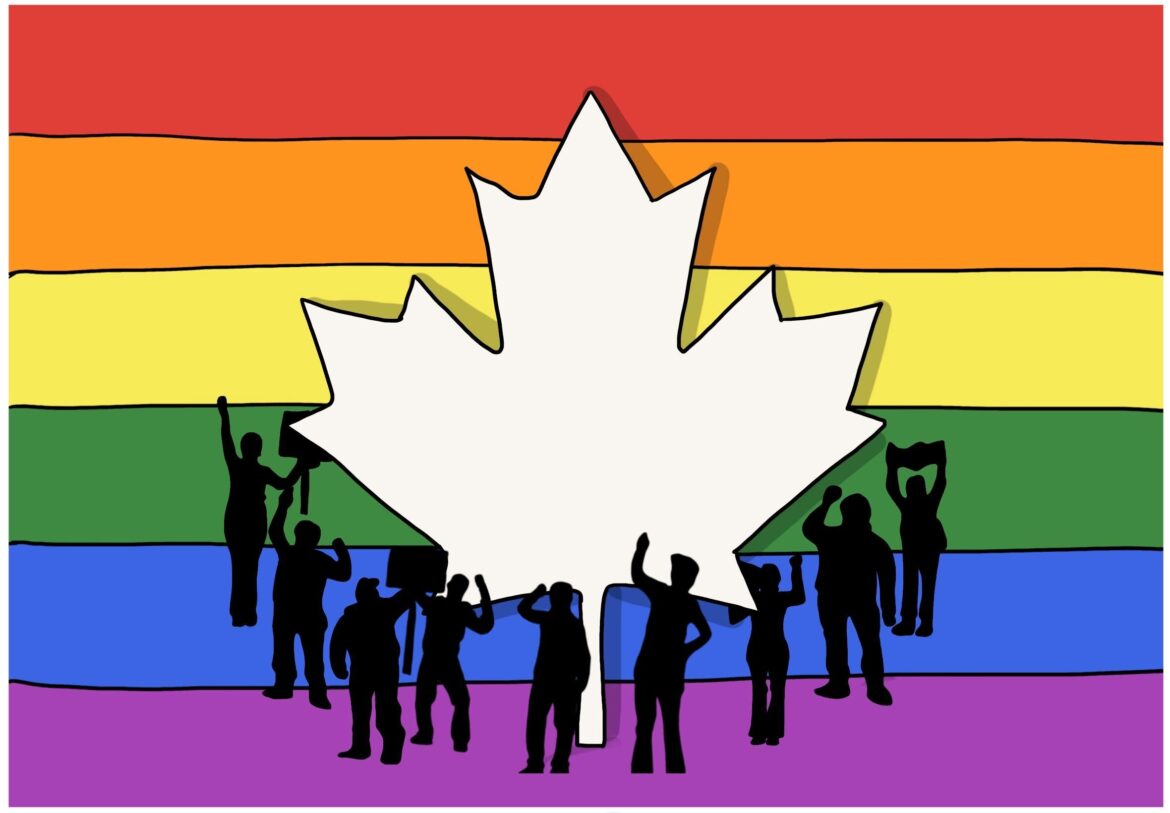Excerpt: In light of the recent anti-LGBTQ+ protests, counter-protests and overall rise in regressive policies and attitudes, Canada must take a firmer stance on their commitment to the rights of all citizens.
The past few years have proved divisive and tumultuous for the LGBTQ+ community in Canada. While overall public support for the community and its members has been rising steadily since 2021, anti-queer movements and legislature still continue to circulate the country, threatening the livelihoods and futures of the community. In the past year, there have been several occurrences of anti-LGBTQ+ demonstrations and rampant political acts against the community, citing the immediate need for counter-action.
A majority of these recent backward advances have targeted the already vulnerable Canadian youth LGBTQ+ population, further endangering individuals who seek acceptance or transitional care as a minor. On August 22nd, the Saskatchewan government introduced the Parents’ Bill of Rights, which would require parent consent for any child under sixteen to use a different name or pronoun/s than that on their birth certificate when at school. The bill was then passed as law on October 20th. This legislation clearly marks a backwards step for the queer community which relies on the right to change one’s name and pronoun/s in order to feel comfortable and legally able to express one’s sexuality and gender orientation. While parental and household rules on pronoun and name usage cannot be established nor protected by the law, lawmakers have a fundamental duty to uphold the independent rights of Canadian youth externally; which should include choice over one’s preferred name and pronouns at school. Lawyers are still divided over whether the passage of the Parents’ Bill of Rights in Saskatchewan can be blocked by the federal government, thus maintaining the rights of LGBTQ+ youths. The passing of this new legislation also comes at a time of increased protest activity against the LGBTQ+ community.
On September 20th 2023, hundreds of individuals took to the streets in a spew of protests against and counter-protests for the LGBTQ+ community. The main organizer of the anti-LGBTQ+ protests is a group called the 1 Million March for Children. It aims to eliminate social justice, racial awareness, and LGBTQ+ rights from school systems and curriculums. The organization has been increasingly active over the past few months with their support of the Parents’ Bill of Rights from its first deliberations in August to its recent passing as law in October. While the new legislature in Saskatchewan and the flagging of similar anti-trans youth policies in New Brunswick were catalysts for the protests, they broadly represent the accumulation of years of transphobic and homophobic hate and violence. Counter protests supporter and BC Teachers’ Federation President, Clint Johnston, calls the impetus for new legislature threatening Canadian LGBTQ+ youth: “part of a movement across North America that uses ‘parental consent’ as a dog whistle for rising homophobia and transphobia.”
The September 20th protests and the passing of anti-trans legislature by select Canadian provinces marks a failure of the nation as a whole to uphold principles of equality and freedoms for people of all ages and identities; further they are unfortunately not isolated events. A recently updated data collection committee found that 2023 saw a record level of hate protests since the start of their study in 2021. While theoretically, with an increased number of LGBTQ+ members coming out and improving educational resources for and about the community, the level of hate being directed should arguably curb or at the very least slow down. However, this has not been the global trend nor the case in Canada. This increase in anti-queer protests, demonstrations, and sentiments, is a deadly recipe for the support and well-being of an already marginalized community.
Furthermore, as we enter deeper into the digital age, an increasing amount of research is being done on the effects of cyber-victimization and digital bullying of LGBTQ+ youth. In September of 2023, a federal government study concluded that cyber victimization is “more likely among certain subpopulations, including transgender or non-binary youth” and “females attracted to the same gender or unsure of their attraction.” These findings speak to the intersectionality of trans and non-binary youth and LGBTQ+ women, putting them disproportionately at harm. In this case, harm comes in the form of digital harassment and violence from peers and anonymous users of unknown ages and sexualities. Analysis done by the Ontario Digital Literacy and Access Network re-enforces the need for “systemic solutions” to the growing threat of digital harassment in order for support of the LGBTQ+ community to be compatible with the digital age.
Another often insidious assault to LGBTQ+ rights is the gentrification of safe spaces and community havens which has been slowly occurring in cities across Canada. Notably, downtown neighbourhoods in Calgary and Toronto where gay bars and drag clubs have historically operated, are being pushed out in favour of new developments; leaving the LGBTQ+ communities in those areas without deliberate socializing spaces. The importance of having these institutions embedded within city culture lies in the community and culture they promote, as well as their implicit pro-political equity stance through simply existing as an LGBTQ+ space in a world which has not always been welcoming. The rich history of these businesses also underscores their importance. Gender and sexuality author and professor Greggor Mattson explains that “after World War II, the bars were the only place you could reliably find other LGBT people because they were the first place LGBT people could gather legally in public.” These community spaces have existed for hundreds of years with the first instance of a gay bar being recorded in history being in 1810. In the words of LGBTQ+ bar The Abbey’s owner David Cooley: “gay bars are more than just safe spaces for LGBTQ to socialize, they’re neighbourhood institutions with their own personalities and unique history.” The continued existence of dedicated LGBTQ+ spaces is paramount to the development of equity and diversity within social spheres, cities and political policies. Without the support of these central businesses by Canada’s municipal, provincial and federal governments, the fight for inclusion of LGBTQ+ communities becomes even harder to achieve.
2023 marks a crucial time in Canada’s acceptance of and institutionalization of pro-LGBTQ+ policies and actions. As members of the community and allies continue to grapple with the ever changing landscape of laws, support and governmental pressure; it becomes more important than ever for provincial and federal governments to increase their commitments to the LGBTQ+ community and secure the equality that is, at present, out of reach.
Edited by Justine Delangle

Sophie Hill joined the Catalyst team in September 2023 and is her first year at McGill University studying International Development Communications. Her research interests include media, culture, technology, international conflict and global justice. Sophie aims to approach her writing from an ethical perspective and seeks to provide analysis using a variety of diverse sources to educate and inspire Catalyst readers.

